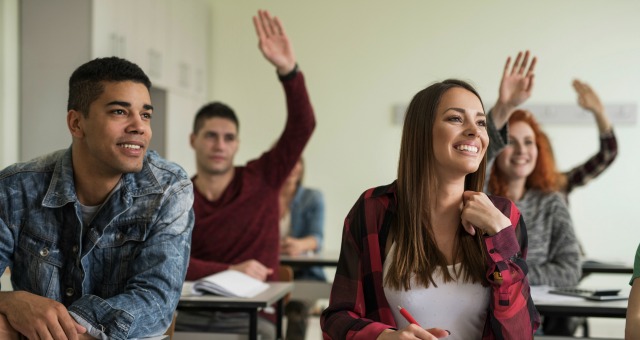Tough Talk... Political Conversations In The Classroom
The intended outcome isn’t to “win,” but rather to carry out respectful political conversations. There are differences among discussion, debate and deliberation in classroom spaces. Discussion is a. Guidelines for Discussing Difficult or High-Stakes Topics The following guidelines can help instructors facilitate classroom discussion around controversial issues. Whatever the context, it is helpful to structure such discussions in a way that defines boundaries for the process and provides some degree of closure within the classroom. TLDR: Please talk about politics as little as possible in a classroom environment. You don’t have to support “your side” at work. Stop forcing students into uncomfortable positions based on their personal political views, which are 90% based on their parents’ views in almost all cases. ATW: Difficult Conversations in the Classroom (Politics) Event Series. Advanced Teaching Workshops. ATW: Difficult Conversations in the Classroom (Politics). The past several years have been a time of great political tension in the US. Our workshop will concentrate on the different ways in which politics finds its way into our classrooms, examining both the internal political conflicts of classroom climate along with what to do when external political beliefs find their way into the classroom space.


Tuesday September 25th marked the largest National Voter Registration Day on record. Over 800,000 people updated their registration or registered to vote for the first time. At the same time that so many Americans are involved in ballot box politics, the country is polarized, partisan and politicized. With sharp political differences seemingly not going away any time soon, how do we support robust discussions in our classrooms? How do we support our students to consider issues from immigration to gun control through deliberation and not shouting matches?
In facing the midterm elections, which will see people vote for members of both houses of Congress, for governor seats in 36 out of 50 states, and a packed California ballot, this panel and community discussion will consider how faculty are navigating the nation’s thorny politics and supporting political conversations in the classroom.
Panelists:
- Professor Lisa Garcia-Bedolla, Director, Institute of Governmental Studies (IGS)
- Professor Irene Bloemraad, Sociology
- Professor Cristina Mora, Sociology
Complimentary lunch will be served following the discussion. Kindly RSVP by October 23 so we can plan accordingly.
In today’s polarized society, discussing politics in the classroom is a challenge. The fear of alienating students, amplifying divisions, or even risking your job can lead many teachers to avoid discussing current events altogether. In fact, it raises the question: do politics belong in the classroom at all?
Even if politics aren’t a part of the lesson plan, discussions about current events are sure to come up throughout the school year, so teachers should be prepared to address these issues with their students. If embraced in a constructive way, discussing politics in the classroom can be an invaluable experience for students of all ages.
In their book The Political Classroom: Evidence and Ethics in Democratic Education, Diana E. Hess and Paula McAvoy contend that deliberating political questions is a crucial component of a democratic education and has wide-ranging benefits for students. They stress the importance of creating a culture of fairness in the classroom and offer guidelines for discussing politics in the classroom based on the results of a comprehensive years-long study that involved 21 teachers and over 1,000 students across 35 schools.
Benefits of Discussing Politics in the Classroom
There are many benefits to discussing politics in the classroom and, with a careful approach, doing so can be a tremendous learning opportunity for students, and even teachers. Engaging in constructive conversation with fellow students can improve kids’ listening skills, teach them to respect the opinions of others, and develop their ability to think critically about complex topics. Sharing ideas about important current events can help build invaluable social and emotional learning skills that can last a lifetime. It can also encourage students to become actively engaged in the democratic process when they reach voting age.

Leading Constructive Discussions
Tough Talk.. Political Conversations In The Classroom -
There are a number of things to keep in mind when discussing politics in the classroom. Establishing ground rules for respectful classroom behavior early in the school year is a vital first step in creating a safe and fair environment for constructive dialogue. Other good things to keep in mind are to:
- Avoid letting discussions turn into competitions or debates.
- Ensure that students do not resort to personal attacks and are making valid, evidence-based contributions.
- Encourage students to have an open mind about issues and to draw conclusions based on a variety of objective sources.
Ultimately, everyone should respect each other, so be sure to model appropriate behavior for your students and monitor for anything that deviates from thoughtful consideration of their peers and their ideas.
Tough Talk.. Political Conversations In The Classroom Free
Sharing Your Viewpoint in a Nonpartisan Way
Discussing politics in the classroom requires a cautious approach. Knowing your students and the environment you’re teaching in will play a large role in how you lead these conversations. Consider school policy, state laws, and a variety of socioeconomic factors before choosing specific topics to discuss.
Educators have a tremendous responsibility to be fair and nonpartisan when leading political discussions. Whether or not teachers choose to reveal their own beliefs or experiences is up to the individual, but this should always be done with respect to diverse viewpoints. Being completely open and accessible to students will help foster an ideal atmosphere for political discussions. Teachers should challenge students to form their own opinions about issues while being careful not to inject their own partisan beliefs. The goal should always be to inspire students to have confidence in themselves as they seek to discover their own identities.
Positive Lasting Effects
Discussing politics in the classroom can have a long-lasting positive impact on students if approached with care. Doing so teaches students how to have mature conversations while also helping them to further develop empathy and understanding. And finally, it can spark a deep thirst for knowledge within students that empowers them to take ownership of their learning as they prepare for college and career.
Tough Talk.. Political Conversations In The Classroom Answer
Sources
Drummond, S. (2015, August 6). Politics in the classroom: How much is too much? NPR. Retrieved from https://www.npr.org/sections/ed/2015/08/06/415498760/the-role-of-politics-in-the-classroom
Tough Talk.. Political Conversations In The Classroom Youtube
Hess, D., & McAvoy, P. (2014). The political classroom: Evidence and ethics in democratic education. New York: Routledge Taylor & Francis Group.
Lutz, A. (2019, January 10). How did we vote? State education 2018 election results from the midterms. Where Learning Clicks. Retrieved from https://blog.edgenuity.com/education-2018-election-results/
Lutz, A. (2018, September 20). The importance of being vulnerable in the classroom. Where Learning Clicks. Retrieved from https://blog.edgenuity.com/the-importance-of-being-vulnerable-in-the-classroom/